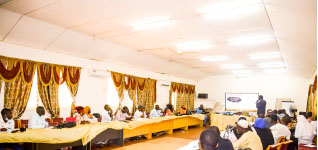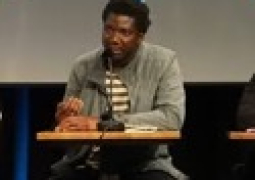
The event, held at the Regional Education Directorate One in Kanifing, was aimed at highlighting the state of STEM education in Africa, with a special focus on The Gambia. It also sought to create a platform to facilitate discussions on the opportunities, challenges, and strategies for implementing integrated STEM education and learner-centered pedagogies.
At the event, Ousman Bah, Director of STED, while welcoming participants, emphasised the importance of the forum in advancing STEM education nationwide.
"No country can progress without STEM education," he asserted.
Mr. Bah maintained that the composition of participants at the forum clearly speaks volume of its importance in ensuring that the knowledge gained would be shared at various units.
The development of informed policy decisions regarding STEM education in The Gambia, he reminded, is necessary if the country is to make any meaningful headway in teaching and learning STEM.
Oswald Rutayisire, Monitoring and Evaluation Officer at ADEA, underscored the importance of the gathering, positing that ADEA is a pan-African orgainisation committed to the development of education on the continent.
The association, he added, is the voice of education in Africa and has played a significant role in the education space for the past 30 years as a convener, knowledge creator, and forum for policy dialogue.
The ADEA official spoke about the gains made in education on the continent, acknowledging that over the past two decades the continent got many of the fundamentals right, enjoying its most sustained period of economic growth and bringing about steady improvements in people’s lives.
Nfally M. Kora, National Assembly Member for Tumana, expressed similar sentiments.
Jerreh Sanyang, deputy permanent secretary at the Ministry of Basic and Secondary Education, described the initiative as important, reiterating that for the Ministry, the teaching of STEM subjects is very important.
He also expressed delight in partnering with this pan-African association in promoting the teaching and learning of STEM in the country.
Despite the challenges, DPS Sanyang maintained that the forum will enable them share and learn best practices and work towards promoting quality education in the country.
Pa Samba BALDEH, Head of National Office, West Africa Examination Council, Banjul, while detailing a comprehensive analysis comparing The Gambia's performance in STEM education with that of other West African countries, revealed that The Gambia became the first country to present candidates for the WAASCE of the 6-3-3 system in 1998.
"When WASSCE was introduced in 1995, the subjects were grouped as; English, Maths, one Science subject -Science, Chemistry, Physis and Biology, adding that one of either Literature-in-English, Geography or History and Agricultural Science or Vocation or Technical subject."
Baldeh recalled that the above grouping was the same for all the other member countries except Ghana, which he said, has four core subjects namely English, Maths, Core Science and Social Studies.
"In addition to these, candidates chose three or four other elective subjects. However, in Ghana, the subjects were arranged in programmes right from the start of the WASSCE. The different programmes are business, science, general, technical, home economics and Visual Arts programmes."
He also spoke about the performance of students especially in STEM subjects, further outlining the entry figures of students from 2021 to 2023 in core subjects.
Baldeh maintained that The Gambia occupies a median position of member countries of WAEC as ranked in order of performance.
"The more the citizen of a country use science in their every day life, the quicker that country develops. "
On the reason why science is not popular among students and why performance is not good in the Gambia, Baldeh attributed that to the way the subject is being taught in the country.
Abdou L.J. Jammeh, senior education officer at the MOBSE, who chaired the event, acknowledged the importance of the event especially in promoting the teaching and learning of STEM in the country.




